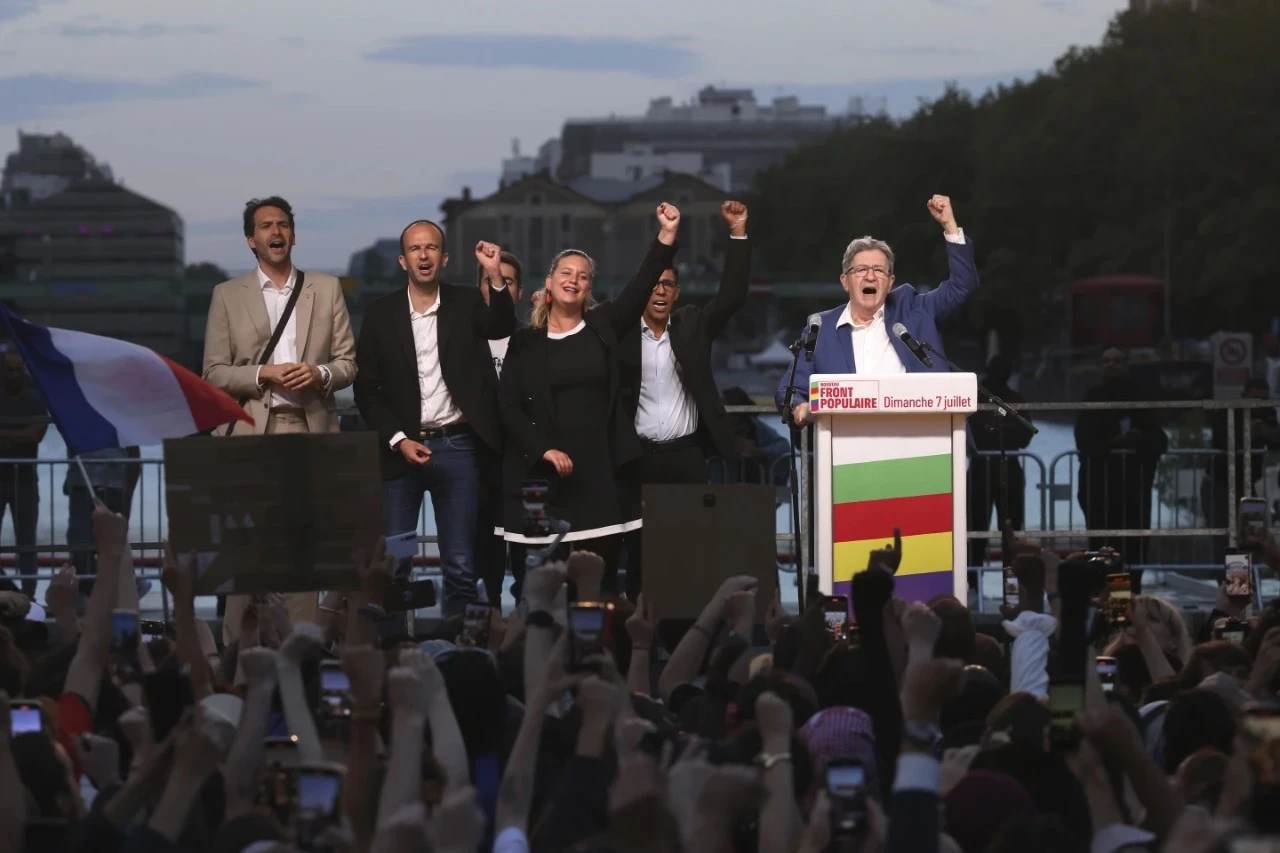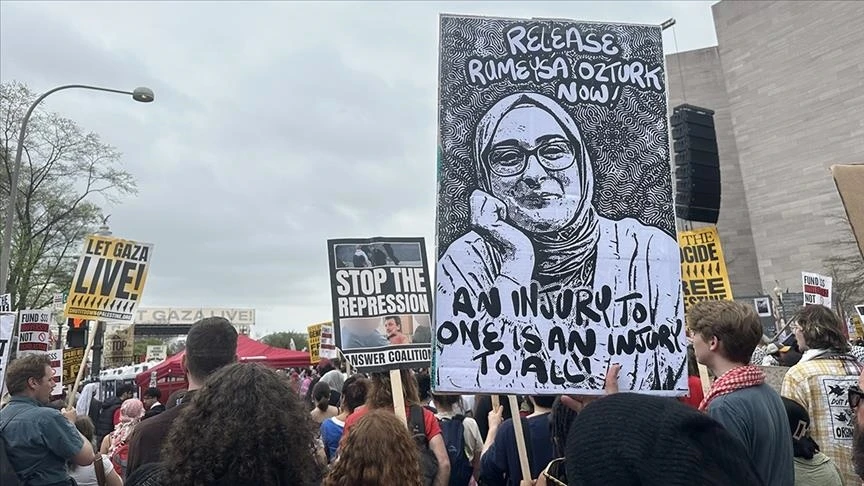French voters reject far right, uncertainty looms without majority
 FLI founder Jean-Luc Melenchon right clenches his first with other party members after the seccond round of the legislative elections Sunday, Paris, July 7, 2024 (AP Photo)
FLI founder Jean-Luc Melenchon right clenches his first with other party members after the seccond round of the legislative elections Sunday, Paris, July 7, 2024 (AP Photo)
In pivotal legislative elections, French voters have decisively supported a broad leftist coalition, preventing the far-right from seizing power. However, with no single party securing an outright majority, France now faces an uncertain and unprecedented political landscape.
President Emmanuel Macron’s centrist alliance secured second place, while the far-right significantly increased its representation in the National Assembly, France’s lower house of parliament, placing third overall.
No clear frontrunner has emerged for the position of future prime minister. President Emmanuel Macron has announced that he will delay making any decisions until after his upcoming trip to Washington for a NATO summit this week. Meanwhile, the newly elected legislators are set to commence their parliamentary duties on Monday, with the first session scheduled for July 18.
Three major political blocs have emerged from the elections, yet none of them have come close to the majority threshold of at least 289 seats out of 577 in the National Assembly.
The National Assembly is the most important of France’s two houses of parliament. It has the final say in the law-making process over the Senate, which is dominated by conservatives.
While not uncommon in other European countries, modern France has never experienced a parliament with no dominant party.
Such a situation requires lawmakers to build consensus across parties to agree on government positions and legislation. France’s fractious politics and deep divisions over taxes, immigration and Mideast policy make that especially challenging.
This means Macron’s centrist allies won’t be able to implement their pro-business policies, including a promise to overhaul unemployment benefits. It could also make passing a budget more difficult.
Macron is considering the possibility of seeking a deal with the moderate left to form a joint government, although such negotiations would be unprecedented and are anticipated to be challenging. The potential alliance might be informal and fragile in nature.
While Macron has ruled out collaborating with the hard-left France Unbowed party, he may extend an invitation to the Socialists and the Greens. However, there is uncertainty whether they would accept his offer.
Last week, Macron’s government suspended a decree that would have reduced workers’ rights to unemployment benefits, a move widely seen as a gesture toward the left.
If Macron fails to reach a political agreement, he might consider forming a government composed of non-partisan experts. Such a government would likely focus on managing the daily operations necessary to keep France functioning smoothly.
Complicating matters: Any of those options would require parliamentary approval.
The left has faced internal divisions in recent months, exacerbated notably after the commencement of attacks in Palestine on Oct. 7.
France Unbowed has been sharply criticized by other more moderate leftists for its stance on the conflict. Hard-left leaders have staunchly condemned the conduct of Israel’s war with Hamas and accused it of pursuing genocide against Palestinians. They have faced accusations of anti-Semitism, which they strongly deny.
The Socialists ran independently for the European Union elections last month, winning about 14% of the votes, when France Unbowed got less than 10% and the Greens 5.5%.
Yet Macron’s move to call snap legislative elections pushed leftist leaders to quickly agree on forming a new coalition, the New Popular Front.
Their joint platform promises to raise the minimum salary from 1,400 ($1,517) to 1,600 euros, to pull back Macron’s pension reform that increased the retirement age from 62 to 64 and to freeze prices of essential food products and energy. All that has financial markets worried.
Prime Minister Gabriel Attal said he would resign Monday. He also said he is ready to remain in the post during the upcoming Paris Olympics and for as long as needed. An interim government would handle current affairs pending further political negotiations.
Macron’s office says he will “wait for the new National Assembly to organize itself” before making any decisions on the new government.
There is currently no set timeline for Macron to appoint a prime minister, nor is there a strict requirement for him to choose a prime minister from the largest party in parliament.
With his term extending until 2027 and a commitment not to resign prematurely, President Macron emerges from the elections weakened due to the lack of a majority, hindering his ability to enact his agenda.
In line with France’s constitution, he still holds some powers over foreign policy, European affairs and defense and is in charge of negotiating and ratifying international treaties. The president is also the commander-in-chief of the country’s armed forces, and holds the nuclear codes.
There’s a possibility the new prime minister would be unable or unwilling to seriously challenge Macron’s defense and foreign policy powers and would focus instead on domestic politics.
The prime minister is accountable to parliament, leads the government and introduces bills.



